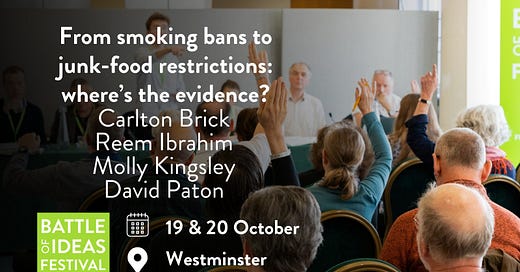Minimum pricing: minimal impact on health
As the Scottish government bumps up the price of booze, Rob Lyons asks where’s the evidence that it will save lives?
The Battle of Ideas festival 2024, which is now less than three weeks away, takes place on Saturday 19 & Sunday 20 October. The festival will feature over 100 debates, hundreds of speakers and thousands of attendees. The festival is a fantastic opportunity to be part of thought-provoking discussions on a huge range of issues. You can see the full programme here and buy tickets here.
Even better, sign up as paid subscriber to our growing Substack community and get a big discount on Battle tickets.
One of the debates this year is titled ‘From smoking bans to junk-food restrictions: where’s the evidence?’ Here, the session producer, Rob Lyons, discusses the latest hike in alcohol prices north of the border and the wider state of the ‘nanny state’ today.
From today, the minimum unit price of alcohol in Scotland is going up to 65 pence. This is not a tax – it’s a government-mandated minimum that retailers and pub landlords must charge. As it goes, the price of a drink in a pub or restaurant is already much higher than the minimum price, so nothing changes there. But for anyone looking to drink relatively cheap booze, the rise (up from 50 pence) produces a few shockers.
Let’s take the prices at Britain’s biggest supermarket chain, Tesco, as a guide. For example, in England, a litre of Tesco Special Reserve Scotch Whisky costs £18. In Scotland, from today, the same bottle will set you back £26 – eight quid more for exactly the same drink. Tesco own-brand vodka (slightly weaker than the Scotch) is £17 per litre in England, and £25.38 in Scotland – an even bigger impact.
Tesco’s cheapest wines in England start at a little over £4, but the price of wine with 12 per cent alcohol in Scotland must be at least £5.85 and moderately strong red wine will set you back at least £6.50. A can of bog standard (four per cent alcohol) session lager is now at least £1.30 in Scotland.
The legislation for minimum pricing was passed in 2012, but implementation was held up in the courts until 2018, when the 50 pence price began to be enforced. At a stroke, this wiped out the legal sale of all ‘ultra-cheap’ booze, like those massive bottles of very strong and very cheap cider beloved of boisterous teenagers in your local park. Yes, the impact of the previous minimum price has been eroded by inflation, but even so, very cheap booze has disappeared from the shelves here.
Has this big bump in pricing led to a collapse in harms from excess drinking? The Scottish government would love you to think so. Last year, Public Health Scotland published a report claiming that the policy had ‘reduced deaths directly caused by alcohol consumption by 13.4 per cent and hospital admissions by 4.1 per cent’. (Well, they would, wouldn’t they?) This claim was based on a modelled counterfactual, in turn based on comparing consumption trends between England and Scotland.
Deaths didn’t go down, in fact – and all the study claims is that they didn’t go up as much as they would have done without minimum pricing. In fact, as Christopher Snowdon pointed out at the time, ‘Scotland’s alcohol-specific death rate rose from 20.5 per 100,000 people in 2017 to 21.5 per 100,000 people in 2020’. Further evidence can be found in this year’s alcohol-related mortality figures for Scotland, which were at a 15-year high.
Rather than admit the policy has been an expensive waste of time, the Scottish government has decided to double down by bumping up the minimum price by 30 per cent. The measure was passed in April this year by 88 votes to 28, meaning it had the backing of everyone – including Labour, Lib Dems and Greens – except the Scottish Conservatives. The Labour-run Welsh government introduced minimum pricing in March 2020 at 50 pence per unit.
In other words, the parties that now run all the different governments in Britain support the policy, despite the lack of evidence for its efficacy in reducing alcohol-related deaths and hospitalisations.
This is hardly a surprise. So-called ‘nanny state’ policies have been in vogue with the political class for decades, but the evidence supporting such rules is scant. Now, the new Labour government in Westminster is promising more of the same. This will include bans on ‘junk food’ advertising online and before the 9pm ‘watershed’ on TV. There is also serious discussion of a ban on smoking outdoors at pubs and restaurants – despite any impact in terms of ‘passive’ smoking seeming to defy the laws of physics, and really only designed to make smokers’ lives more miserable. There will certainly be an age-related ban on buying tobacco products, with no one born after 1 January 2009 allowed to do so, with all the ludicrous anomalies that will create.
Of course, the only thing absent from all of this is any sense that we should be allowed to make such choices for ourselves. This is not a ‘nanny’ state – at least nannies have the interests of their charges at heart. This is a serious and pernicious assault on our freedoms. As John Stuart Mill pointed out in On Liberty back in 1859, an increase in price is just prohibition for the poor.
If we want to defend our everyday freedoms, it’s time for a push back against the evidence-lite, liberty-reducing policies of the elite.





